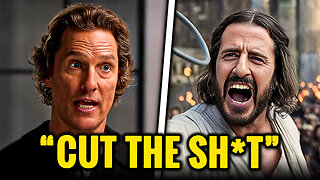Premium Only Content

Episode 3130: Continuity and Compromise: Pope Leo's Episcopal Choices - Morning Episode
Nightly Zoom Coordinates for Rosary:
Meeting ID: 865 8978 0399
Passcode: Wjjv4960!
Speak Lord for your Servant is Listening
Book Recommendation of the Day
The Life of St. William of Montevergine"
• Author: Unknown monk of Montevergine (likely 13th century)
• Language: Latin original; some translations may be available in Italian or English
• About: This is the primary hagiography of St. William. It recounts his miraculous birth, his austere life of penance, his pilgrimage to Santiago de Compostela, and his foundation of the Montevergine monastery.
This morning, faithful Catholics across the world woke to the distressing announcement of yet another episcopal appointment by Pope Leo XIV with the reconfirmation of Cardinal Roche the author of Trad-Cus.
Cardinal Arthur Roche
• Role: Prefect, Dicastery for Divine Worship and the Discipline of the Sacraments
• Reconfirmation Date: At the initial re-appointments by Pope Leo XIV (immediately following the end of Pope Francis’s papacy)
• Term Status: His previous five-year term (which began under Francis) would be up for renewal around May 2026
Pope Leo XIV’s Appointments: A Traditional Catholic Analysis
1. Baldassare Reina
Title / Role: Grand Chancellor, John Paul II Institute for Marriage and Family Sciences
Date: May 19, 2025
Traditional Catholic Perspective:
This appointment is seen as cautiously neutral. Archbishop Reina is known for competence in governance but has not been vocal in defending traditional Catholic moral theology, especially in areas such as indissolubility of marriage, contraception, and natural law. Traditional Catholics still mourn the 2019 overhaul of the JP II Institute under Pope Francis, which shifted focus away from immutable moral truths toward more “pastoral” and psychological models. Reina's appointment does not signal a restoration of the Institute’s original Thomistic rigor.
⚠️ Verdict: Not a clear return to traditional doctrine—merely administrative continuity.
2. Cardinal Pietro Parolin
Title / Role: Retained as Secretary of State (pending formal confirmation)
Date: Transition phase
Traditional Catholic Perspective:
Cardinal Parolin represents the heart of the Francis-era Vatican bureaucracy, closely tied to the diplomacy-first, ambiguity-laden approach to doctrine and ecclesial life. His role in the Vatican-China deal, support of synodal decentralization, and failure to defend tradition in liturgy or moral teaching mark him as deeply out of step with traditional Catholic values. Retaining him even temporarily deeply concerns traditional Catholics who were hoping Pope Leo XIV would distance himself from the “Francis machine.”
⚠️ Verdict: A major disappointment for tradition-minded faithful symbol of doctrinal compromise.
3. (Speculative) Fabio Fabene
Title / Role: Potential Vatican collaborator (past Secretary in the Dicastery for Bishops)
Status: Under review
Traditional Catholic Perspective:
Fabene’s background in episcopal appointments under Pope Francis does not inspire confidence. He is viewed as a bureaucratic moderate, not a champion of orthodoxy or liturgical tradition. His association with the formation of bishops means that, if appointed, he may continue to advance “safe,” status-quo prelates, many of whom avoid clarity on moral and doctrinal matters.
⚠️ Verdict: Likely to maintain the “bland bureaucracy” rather than correct the crisis of weak episcopal leadership.
4. (Speculative) Ilson Montanari
Title / Role: Potential collaborator
Status: Under review
Traditional Catholic Perspective:
Archbishop Montanari has previously served as Secretary of the Congregation for Bishops and was seen as a pragmatic insider. While not as aggressively modernist as others, he has never shown strong support for tradition, nor has he stood up against the marginalization of Traditional Latin Mass communities.
⚠️ Verdict: Neither an ally nor an enemy traditionalists would call this more “institutional maintenance.”
5. (Speculative) Sister Nathalie Becquart (Note: likely the intended “Sister Caitquart”)
Title / Role: Potential collaborator
Status: Under review
Traditional Catholic Perspective:
Sister Becquart is perhaps one of the most controversial figures among traditional Catholics due to her leadership in the Synod on Synodality and her views on lay governance, women's roles in the Church, and potential pathways toward greater female participation in hierarchical structures. Her support for female diaconate “discussion” and ambiguous approach to ecclesiology is deeply problematic from a traditional Catholic standpoint.
❌ Verdict: Alarm bells. Seen as a progressive agent of ecclesial revolution.
6. (Speculative) Alejandro Moral Antón
Title / Role: Potential collaborator; Prior General of the Augustinian Order
Status: Under review
Traditional Catholic Perspective:
Father Antón’s Augustinian background and emphasis on spiritual formation give some reason for hope among traditional Catholics, particularly if he can anchor spiritual leadership in the tradition of St. Augustine and the Fathers. However, his recent comments reflect a generally “balanced” approach rather than a strong counter to modernist errors. Still, he has not been hostile to tradition, and his voice could be a quiet ally for restoring authentic Catholic spirituality.
✅ Verdict: Watch with hope, though prudently—could be a bridge figure toward reform.
Rather than signaling renewal, this decision deepens the sense of unease already present among those who have longed for a return to clarity, conviction, and fidelity to Tradition.
We must say this plainly, but respectfully: we are not looking for perfection in a man. We are not demanding saints on day one. What we ask what Holy Church has always needed are bishops who are faithful. Men who love Sacred Tradition, revere the Church’s teachings, defend the Deposit of Faith, and guard the flock entrusted to them with zeal and courage.
Sadly, many of the men being reappointed today—men molded in the ideology of the previous pontificate—have undermined that very mission. They restrict the Traditional Latin Mass, diminish moral clarity, and conform to the world rather than transform it. These are not defenders of the Church’s patrimony. They are its dismantlers.
The Power of Appointment
The modern papacy may be burdened with overwhelming responsibilities, but its power to appoint bishops remains among its most direct and influential tools. Every appointment carries a theological message. Every red hat and every diocesan see entrusted to a man shapes the Church’s future for generations.
Let us not forget: the Church does not reform herself through committees or conferences. She is reformed through holy leadership. If Pope Leo XIV wishes to begin authentic renewal, the answer is surprisingly simple: appoint one man—just one—like Pope St. Pius X. A man of clarity. A man of holiness. A man of Tradition.
The Model: Pope St. Pius X
In E Supremi (1903), Pope St. Pius X declared:
“To restore all things in Christ has ever been the Church’s motto, and it is especially Our own during the time of Our Pontificate.”
Faced with the rise of modernism and theological confusion, he wasted no time. He reformed seminaries, elevated faithful bishops, restored reverence to the liturgy, and condemned error with love and precision.
We do not need a thousand voices. We need one faithful voice with authority.
Imagine a pope today who appointed Bishop Athanasius Schneider to lead the Congregation for Bishops. Imagine he gave the red hat to a bishop who kneels before the Blessed Sacrament, defends the Latin Mass, and loves Our Lady with childlike devotion. That one act would shake the foundations not with rebellion, but with renewal.
What the Faithful Must Do
Though we may not sit in Rome, we are not helpless. As baptized members of the Mystical Body of Christ, we must:
• Pray—fervently—for our Holy Father, not that he be diplomatic, but that he be faithful.
• Speak—clearly and charitably—when truth is at stake.
• Support—with our prayers and resources—those priests and bishops who stand firm in the faith once delivered to the saints.
Let us now turn from the present crisis to the timeless wisdom of the Church’s sacred liturgy. The Epistle and Gospel today, drawn from the 1945 St. Andrew’s Daily Missal, speak directly to us—calling us to integrity, love, and fidelity to God’s holy law.
Epistle – Ecclesiasticus 31:8–11
“Blessed is the rich man that is found without blemish… He that could have transgressed, and hath not… Therefore are his goods established in the Lord, and all the church of the saints shall declare his alms.”
Reflection:
This passage celebrates a rare kind of virtue righteousness preserved in the midst of opportunity. It is not merely about having wealth, but about having restraint, integrity, and the fear of God. “He that could have transgressed, and hath not.” That man is blessed not because he lacked temptation, but because he triumphed over it.
The just man is not lazy. He is vigilant. He could have indulged but instead he chose fidelity. His legacy is not stored in bank vaults, but in the memory of the Church, the eternal gratitude of the poor, and the favor of the Lord.
Gospel – Matthew 22:29–40
“You err, not knowing the Scriptures, nor the power of God… Thou shalt love the Lord thy God… And the second is like unto it: Thou shalt love thy neighbor as thyself. On these two commandments depend the whole law and the prophets.”
Reflection:
Christ exposes the failure of the Pharisees not their lack of religious effort, but their spiritual blindness. They knew the law, but not the love behind it. Jesus draws them and us back to the essence: love of God above all, and love of neighbor for God’s sake.
These two commandments are not sentimental ideas. They are the foundation of all doctrine. The Ten Commandments, the moral teachings of the Church, the Sacred Liturgy all exist so that we might love rightly: with order, reverence, and truth.
Saint of the Day – St. William, Abbot (†660)
Today we honor St. William, a holy abbot and reformer, known for his deep interior life and monastic discipline. He understood what modern bishops forget: that reform begins with obedience to divine law and love rooted in self-denial. He led his monks not by innovation, but by example, building a community where the Rule of God reigned supreme.
Like today’s Scriptures, his life reminds us that virtue is the fruit of sacrifice, that love flows from discipline, and that holiness begins with silence, prayer, and submission to God’s will.
Themes & Quotes for Meditation
• Integrity amid trial:
“He that could have transgressed, and hath not.” – Ecclesiasticus 31:10
• Love as law’s fulfillment:
“Thou shalt love the Lord thy God…” – Matthew 22:37–39
• St. Augustine:
“Love, and do what you will.”
(Because true charity never violates God’s law.)
• 🔹 Theme 1: Virtue is courageous restraint exercised in freedom.
• 🔹 Theme 2: Loving God and neighbor isn't optional it's the essence of holiness.
• 🔹 Theme 3: Law and love are not opposites; they flow from the same Divine Heart.
________________________________________
🙏 Concluding Prayer
Let us pray:
O Lord Jesus Christ, who didst fulfill the law through love, grant us the grace to walk in the integrity commended in Holy Scripture. May we use the freedom You give not for sin, but for sanctity. May we be found, like the just man, without blemish in the hour of temptation.
Through the intercession of St. William, who built his life upon obedience to Your will, strengthen our hearts to love You with all our mind, soul, and strength—and to love our neighbor not in words alone, but in truth and sacrifice.
Make us men and women of virtue—not merely law-abiders, but lovers of Your Sacred Heart. Root out cowardice from our clergy, confusion from our hierarchy, and indifference from our souls.
St. William, pray for us.
Pope St. Pius X, intercede for the Church in this hour.
Our Lady of Grace, obtain for us purity of heart.
In the Name of the Father, and of the Son, and of the Holy Ghost. Amen.
-
 9:10
9:10
Faith Frontline
11 hours agoMatthew McConaughey Just Said What No Celebrity Dares to About Jesus
100 -
 27:03
27:03
Take FiVe - His Glory
1 day agoEp 2112: Sam Anthony: How Citizen Journalism is Replacing Legacy Media | Take Five
6.92K2 -
 10:01
10:01
Breaking Points
17 hours agoKJP GASLIGHTS On Biden's Age In BONKERS Book Tour
6121 -
 11:31
11:31
Nate The Lawyer
14 hours agoJohn Bolton Indictment Explained | Even MSNBC Says He Is in BIG Trouble!
2322 -
 25:46
25:46
DeVory Darkins
1 day ago $10.36 earnedICE raid erupts into chaos when protestors targeted ICE Agents as ABC suffers disastrous interview
9.3K28 -
 LIVE
LIVE
Side Scrollers Podcast
3 days ago🔴FIRST EVER RUMBLE SUB-A-THON🔴DAY 3🔴PLAYING MIKE TYSON'S PUNCH OUT TILL I WIN!
1,432 watching -
 6:06
6:06
Congressman Eli Crane
19 hours agoThe "Affordable" Care Act | Democrats' Greatest Lies – Vol. 3
2.6K2 -
 1:07:05
1:07:05
TruthStream with Joe and Scott
1 day agoMorocco, Fix The World Project, EMF Protection, Camels and more! Premiers 10/22 All links below!! #502 Premiers 10/22 3pm pacific 6pm Eastern
76.6K11 -
 1:41:55
1:41:55
MattMorseTV
1 day ago $29.82 earned🔴Trump meets with GOP Senators over SHUTDOWN. 🔴
31.7K64 -
 24:23
24:23
Nikko Ortiz
2 days agoArmy Officers Might Need Help...
31.8K15